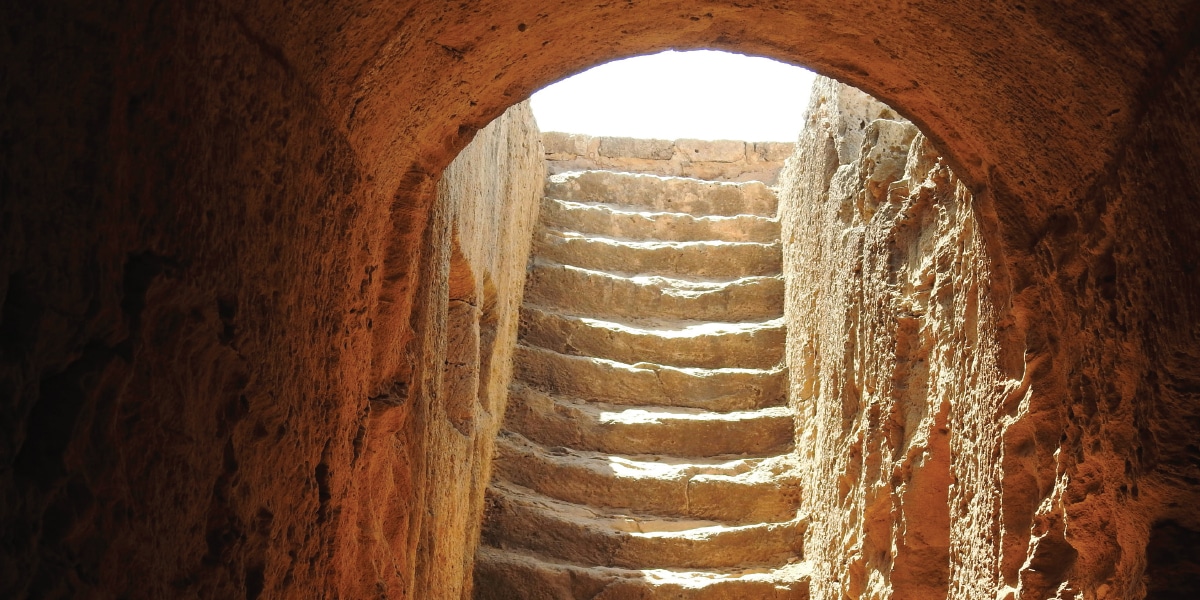I realize that the New Testament Gospels differ on some details about the women who found Jesus’ tomb empty on Easter Sunday morning. Don’t the variations in these stories undermine the credibility of Jesus’ resurrection?
Not really. Yes, Matthew has one angel rolling back the stone, sitting on it outside, and telling the women that Jesus has been raised and awaits them in Galilee (28:7–10). Mark presents a similar story but with one angel inside the tomb (16:5–7). Luke, however, has two angels inside the tomb, testifying that Jesus has risen (24:3–8).
John, however, records that the women discover an empty tomb, run to tell Peter and the other apostles (20:2), follow Peter and the Beloved Disciple back to find the tomb empty, and then return to Jerusalem. Only then do two angels appear inside, but they do not speak to the women. A man whom Mary Magdalene presumes to be a gardener who has moved the body turns out to be the risen Jesus (20:1–18), whom she recognizes when he calls her by name.
After Peter and the Beloved Disciple run to the tomb, Peter looks in and sees the burial shroud neatly folded, but the cloth that had covered Jesus’ face neatly rolled up nearby (v. 7). That is a curious detail! If Jesus’ body had been stolen, why would the thieves have taken the time to fold up and leave the burial cloths?
The Gospels initially accept the easiest explanation for this empty tomb: Someone had stolen the body of Jesus. That, in fact, is the story that Jesus’ opponents will tell: The disciples of Jesus stole the body despite the presence of Temple guards hired by the Jews (Mt 28:12–15).
Furthermore, in Luke, the apostles refuse to believe the women who report the empty tomb (24:23). The story of the women who first saw the empty tomb is described that same evening by two disciples walking to Emmaus as “a tale that they had seen a vision of angels who proclaimed that Jesus was alive, but him they did not see” (24:23–24).
Jewish practice then judged the testimony of four women equal to that of two men, the legal minimum for testimony. The Gospels bend over backward to offer the easiest possible explanation for the empty tomb.
urrWhen the apostles encounter the risen Christ on Easter Sunday evening, they immediately think that they are seeing a ghost (Lk 24:37). Jesus then promptly eats a piece of baked fish before them, something no ghost could do.
Although the details of what happened at the empty tomb on Easter Sunday morning certainly vary, the folded up burial cloths affirm Christianity’s central truth: Jesus rose from the dead on Easter morning.
Catholicism and Ghosts
What is the Church’s stance on the existence of ghosts and paranormal experiences?
The Catholic Church does not condone spiritual beings who can control and/or change a person’s future. That would rival God’s uniqueness or authority.
In 1 Samuel 28:7, King Saul asks a medium in Endor to summon the spirit of the deceased prophet Samuel for advice about an upcoming battle. After Samuel vigorously protests this disturbance, he tells Saul the battle will not go well for him—and it does not.
According to the Catechism of the Catholic Church, “All forms of divination are to be rejected: recourse to Satan or demons, conjuring up the dead or other practices falsely supposed to ‘unveil’ the future. Consulting horoscopes, astrology, palm reading, interpretation of omens and lots, the phenomena of clairvoyance, and recourse to mediums all conceal a desire for power over time, history, and, in the last analysis, other human beings, as well as a wish to conciliate hidden powers. They contradict the honor, respect, and loving fear that we owe to God alone” (2116).
Magic or sorcery attempts to tame occult powers “so as to place them at one’s service and have a supernatural power over others—even if this were for the sake of restoring their health—are gravely contrary to the virtue of religion” (2117).
Recognizing Holiness in Ancient Times
How did ancient Jews and others recognize the presence of the Holy Spirit in certain individuals?
Genuine prophets speak for God, never to promote some personal or group advantage. Their lives of integrity (accepting God’s standards and understanding of normal) reflect the Holy Spirit. All lives of integrity mirror this.
What Jesus tells Nicodemus (“The wind blows where it wills,” Jn 3:8) is always true, including in Old Testament times. God’s spirit is powerful (Acts 2:1–41). Jesus taught with authority (Mt 7:29, Mk 1:22, and Lk 4:32) because he was filled with the Holy Spirit.
Jubilee Year 2025
I heard that Pope Francis will open a jubilee year this Christmas. Could you share some details, please?
On May 9, Pope Francis released Hope Does Not Disappoint (Rom 5:5). It is an official document that describes the aims of the previously announced Pilgrims in Hope Holy Year that begins this Christmas Eve and runs through Epiphany 2025.
As he did with the 2015 Extraordinary Year of Mercy, this will be celebrated not only in Rome but also in churches throughout the world. He cites the unity of creation celebrated in St. Francis of Assisi’s “Canticle of Creation” and the Portiuncula indulgence encouraging forgiveness of sins. Pope Francis connects the pilgrim theme with renewed work for peace, giving special attention to prisoners, the sick, the young, the elderly, and all those who lack life’s necessities.
Visit Iubilaeum2025.va for more information. Note: The first letter in the website referenced is the letter I, not J, based on the Latin spelling of the word jubilee.


